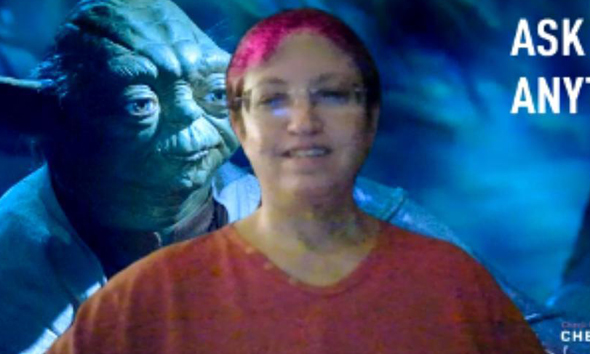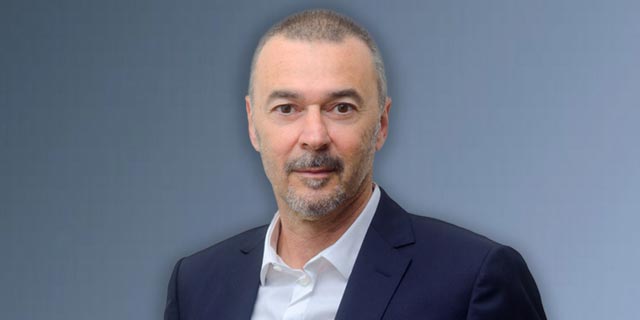
“Covid-19 did more good than ill. We refrained from layoffs and cutting salaries. We’re hiring”
Dorit Dor, the number 2 executive at cybersecurity giant Check Point talks about the impact of coronavirus on the company
Diana Bahur Nir | 10:41, 07.06.20
“We don’t wish for any startup to fail so that we can buy it up. If there will be opportunities we are prepared to take advantage of them,” Dorit Dor, vice president of product, research, and development at Check Point, considered to be the number two person at the company after the CEO Gil Shwed, said in an interview with Calcalist with the face of Yoda from the Star Wars series peeking out on her Zoom screen saver.
“I have all sorts of backgrounds,” Dor says with a smile. “My hair isn’t purple in reality either, it’s like this because of Snap Camera. You can be whatever you want, so I’m enjoying the experimentation.” Dor, the most senior female executive at an Israeli tech company is cautious about being thankful for the coronavirus crisis but concedes that “it did more good than ill” and predicts that the world of work will emerge from the crisis very different than it was going into it.
Check Point is traded on Nasdaq at a market valuation of more than $15 billion. In terms of its stock performance, the company has navigated the outbreak and its fallout successfully with its share price back to what it was in August 2019. Check Point’s market value is the highest of any Israeli company, followed by Teva Pharmaceutical Industries Ltd. and NiceSystems Ltd..
So, Covid-19 did good things? Demand for data protection soared?
“I wouldn’t characterize something that so many people suffered from as a good thing. Many spouses of Check Point employees lost their jobs, but for me, it did more good than bad. There is a lot of work in the security sector, the digital transformation and move to work from home caused a lot of security challenges. It’s not a case of new projects that didn’t exist beforehand, it’s just that all at once the world started engaging with it in an expedited way. They say that you should never let a crisis pass you by—it is a good opportunity to try new things, to rethink what you do, and exit the coronavirus period differently than how you entered it.”
What are the hot issues at the moment?
“The first thing is the massive shift to working from home. The second is the expediting of digital transformations within organizations, with access to networks that impact security. The third is the increase in security concerns of organizations that all at once opened up to the world and whether they applied adequate defenses. If you shifted an operation of 100,000 people to work on a cloud-based network from home and left a door open, you’ve got to close it. Attackers look for such lapses to infiltrate through.”
Do you routinely use Zoom, which is highly hackable?
“At the start, Zoom created a very easy way to use the application, which is why the whole world chose to use it. The system’s default settings were in favor of ease of use with little regard for security. It was easy to break into a call and upload an inappropriate video. But compared to the bad press it received, Zoom was actually pretty quick to install remedies. They changed the default settings and added information protection features that didn’t exist because they recognized the critical necessity. Because of the speed and quality of their reaction, we stuck with Zoom. We felt that they responded quickly and were very attentive to our concerns.”
Check Point didn’t lay off any workers or send them on unpaid leave. That is a rare privilege these days.
“We didn’t cut salaries either. We managed the wage updates like we do every year. We are also hiring for new positions. One effect of the coronavirus is that fewer people are leaving the company. Another, is that we can take advantage of the situation of people leaving younger startups or established companies from sectors that were hard hit by the virus, like the travel tech industry, and recruit quality personnel. We are also continuously looking at the startup sphere for potential acquisitions. We are a company that doesn’t work according to hype so our routine working model works also in cases of emergency. If there was a crown jewel available, we would have pounced on it in any case.”
What are you looking for? What startups would be a hot acquisition prospect for Check Point?
“We want to strengthen our security portfolio with quality teams and products. So we’re inviting those who are active and those who, because of the circumstances, are less active, to talk to us. Quality acquisitions are something that we are always on the lookout for, especially now. If the opportunities arise, we are ready to take advantage of them. Today’s needs are not new, they are existing needs that are simply expedited.”
For example?
“The IT sector. The cloud industry was one that was already hot and we are continuing to take care of it. Some sectors heated up more than others. Remote medicine, for example, has many parameters that are similar to other remote activities, like digital banking or insurance, which all have similar problems that require solutions. At the end of the day, the root data protection problems are the same. It’s not the case that there is a sector I’m interested in now and wasn’t beforehand.”
Do you miss the travel aspects of the job?
“I was abroad seven times between December and March. After I returned the last time, they closed up the skies. Going cold turkey was hard for me, as soon as I can, I will be on a plane. I met clients from Spain, Italy, Germany, France, Portugal, India, and many other places via Zoom. I look forward to meeting them in real life.”
How did you prepare for the world going still and the shift to work from home?
“In mid-March, our first priority was helping our clients. We established a steering committee to understand what needed to be done in all corners of the world We were called upon to carry out sharp and rapid changes. At the same time we moved all of our 5,400 employees to work from home. As a vital operation, we could have brought as many workers as we wanted to come to work in the office, but only those who really wanted to actually came in. We told our employees that if they feel more productive working remotely, they are welcome to. We didn’t set deadlines like other companies. Close to 50% of the workers were at the office these last two weeks, but they have a choice. Around 25% of them come into the office daily, out of personal choice, the rest work from home.”
The departure of
Marius Nacht, one of the three founders of Check Point will strengthen its association with founder and CEO Gil Shwed. Where you surprised by his leaving? Will it impact the company?
“Marius has been developing all sorts of other business for a long time, some even contributing to important causes. There was the digital bank, which he also left, but he managed to build a substantial force in the BioMed sector - a very substantial force that I hear about abroad too. It’s an investment in a field that is considered difficult to invest in. How long was he mulling his departure? You’d have to ask him. He is a very significant person. We worked together closely. But the business he turned to is also important for Israel. We remain a family regardless of the role. It’s clear to me that if we want his assistance, he’ll be there to help. As to Check Point’s association with Gil, it’s only natural that the company will be associated with his daily and hourly leadership.”
Is it frustrating to you that out tech sector is so devoid of women in senior management roles like yours?
“It goes back: the percentage of women in core tech positions is about 20% and that low starting point diminishes over time. I am active in projects like “she codes” that aims to help women become developers and enter the computer industry. At Check Point, I participated in a mentoring program to help women advance in tech leadership. It is frustrating and I don’t think I found a miracle cure, but even awareness helps. There is a nice number of women in Check Point’s management, but the path to full 50-50 equality is still a long way off.“
What helped you, personally?
“I advanced in a male-dominated path, at high school, in the military, since it didn’t bother me personally, it took me a while to acknowledge the problem. Workplaces miss out on talent, women miss out on financially rewarding work, besides the fact that all organizations require diversity. We need to increase the number of women in the profession and cultivate their professional advancement. Part of it also has to do with mentality. When a new man arrives at the company, he immediately plans his future path to the VP role, women meanwhile engage in more modest ambitions. You need to remind her of her qualities if you want her to succeed.”
Three-quarters of your impressive ‘green’ building in Tel Aviv stands empty. What lessons did you learn?
“Surveys we conducted found that 60% of the people prefer to work from home under the present circumstances. 20% said they prefer to work from the office and 20% said it made no difference to them. Maybe when public transportation is back and the kids return to school the number will rise. There will be those who prefer to work remotely, but my guess is that more will choose to work in a hybrid model, which will force us to adopt models that aren’t black and white like they used to be. Organizations that assumed that everyone has to come into the office every day will have to create more flexibility. Generation-Z appreciates the flexibility. Covid -19 will pass, but its effects will stay on in terms of the work environment, the security world and its products, and in the way we interact with clients.”
How do you explain the euphoria of the Nasdaq rising by 9% from the start of the year while we know there are tech firms that were severely hurt by the crisis?
“The numbers are out of sync with the problems we are witnessing in the world, with companies closing down, whole industries becoming less relevant and global unemployment. The world likes to operate based on hype and good news. As soon as the door is opened, we exit and see that there is no more coronavirus we choose to be optimistic. If a company produces good results it automatically produces optimism in the market. Over time the market will have to accurately represent the real-world circumstances. I personally think there is excess optimism in terms of the real economy. But I get where it comes from, people want things to be good. Everybody is already planning their summer vacation even though there is no essential change in the circumstances. It feels like we are on the verge of concluding the crisis, but the outcomes of what we experienced are not over yet.”


